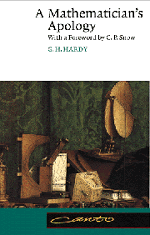Summary
IT will probably be plain by now to what conclusions I am coming; so I will state them at once dogmatically and then elaborate them a little. It is undeniable that a good deal of elementary mathematics—and I use the word ‘elementary’ in the sense in which professional mathematicians use it, in which it includes, for example, a fair working knowledge of the differential and integral calculus—has considerable practical utility. These parts of mathematics are, on the whole, rather dull; they are just the parts which have least aesthetic value. The ‘real’ mathematics of the ‘real’ mathematicians, the mathematics of Fermat and Euler and Gauss and Abel and Riemann, is almost wholly ‘useless’ (and this is as true of ‘applied’ as of ‘pure’ mathematics). It is not possible to justify the life of any genuine professional mathematician on the ground of the ‘utility’ of his work.
But here I must deal with a misconception. It is sometimes suggested that pure mathematicians glory in the uselessness of their work, and make it a boast that it has no practical applications. The imputation is usually based on an incautious saying attributed to Gauss, to the effect that, if mathematics is the queen of the sciences, then the theory of numbers is, because of its supreme uselessness, the queen of mathematics—I have never been able to find an exact quotation.
- Type
- Chapter
- Information
- A Mathematician's Apology , pp. 119 - 121Publisher: Cambridge University PressPrint publication year: 1992

